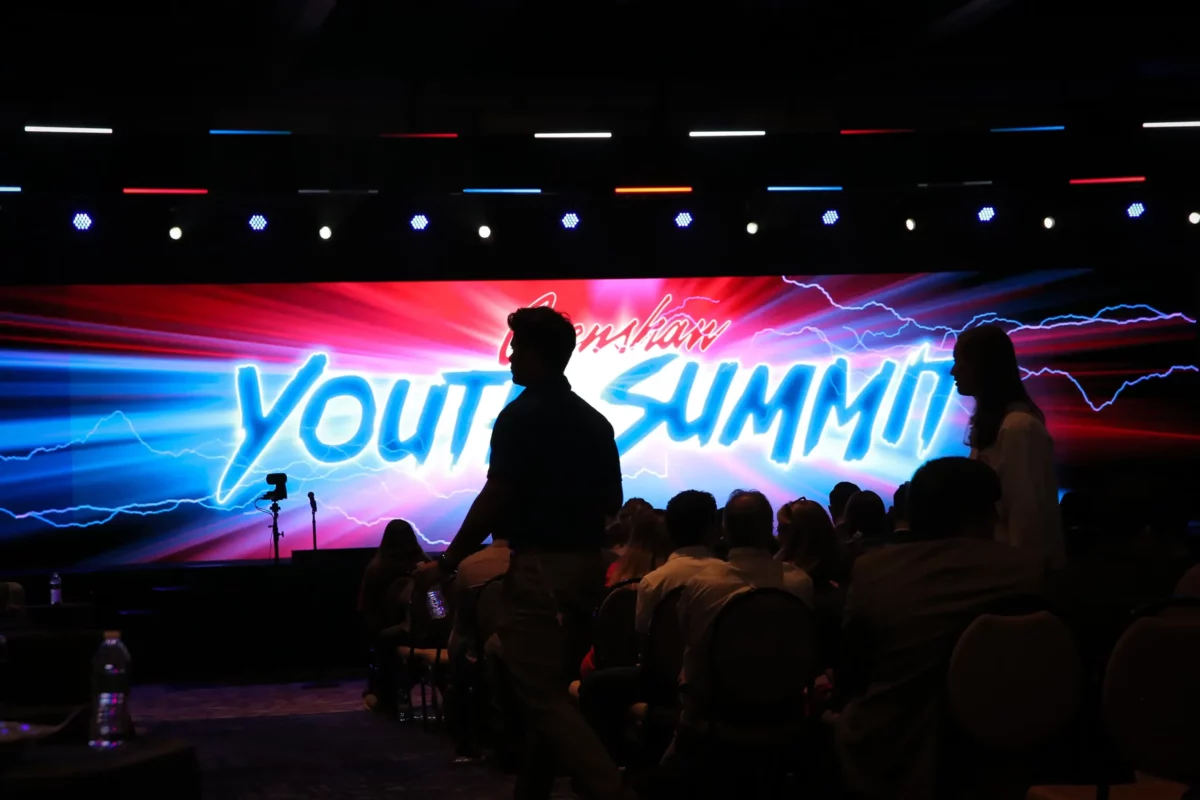U.S. Rep. Dan Crenshaw wants a new Reagan revolution — a return to the 1980s-era Republican Party pillars of small government, low taxes and less welfare that he says have been crowded out by infighting in recent years.
The yearning for an earlier era was made clear by the Delorean that was parked next to the stage of the third annual Crenshaw Youth Summit at the Hilton Hotel in downtown Houston this weekend, at which Crenshaw called on a few hundred young conservatives to cease toxic ongoing party squabbles, and unite to preserve the vision outlined by Reagan decades ago.
“These divisions are manufactured. They’re not real. They are manufactured by opportunists online, on TV and on social media who can’t string a sentence together about serious public policy,” he said. “They say they fight for you, but the truth is they only fight for your attention. They fight for your fundraising dollars, they fight for your clicks, your likes, your views — knowing that America has been conditioned to be attentive to only drama.”
The event came as a younger, more diverse generation of Americans increasingly flocks to the left. Among Generation Z — those born after 1996 — slightly more than half are non-Hispanic white, according to Pew Research. Twenty-five percent are Hispanic, 14% are Black, 6% are Asian, and 5% are some other race or two or more races.
It’s a particularly concerning trend for the Texas GOP as it heads into midterm elections next month and as Democrats rally around key issues for younger Americans, including LGBTQ rights and abortion access. While most polling shows Gov. Greg Abbott and other top-ticket candidates leading in their respective races, young Texans lean much more to liberal figures, such as Abbott challenger Beto O’Rourke, than they do longtime GOP mainstays.
“This is something that the GOP has struggled with for a long time,” said Brandon Rottinghaus, a University of Houston professor of political science and longtime observer of Southeast Texas politics. “I like to joke with my students that the current crop of Republican candidates put the ‘old’ in ‘Grand Old Party.’ They all look like the younger voters’ grandparents, and that’s not the best way to attract a younger audience.”
That, Rottinghaus said, has provided an opening for figures such as Crenshaw, a 38-year-old former Navy SEAL who is all-but certain to win reelection in November. The two-term congressman was once a rising star in the Republican Party, but increasingly has warred with figures such as Georgia Republican U.S. Rep. Marjorie Taylor Greene — who Crenshaw recently called an idiot — and other Trump allies. Far-right media similarly have targeted Crenshaw, and he’s responded with denunciations of them as part of the “woke right.”
Crenshaw’s two-day conference was marketed to teenagers and young adults through their mid-20s, and featured many of normal GOP talking points from Abbott, longtime conservative radio commentator Dennis Prager, National Review Editor Rich Lowry and Babylon Bee CEO Seth Dillon, among others.
A similar youth summit was held last month in the Woodlands, and featured far-right and Christian Nationalist figures, such as Greene and U.S. Rep. Lauren Boebert, R-Colorado. But whereas that event focused heavily on the culture war issues that have come to define so much of the Republican Party platform, many attendees at Crenshaw’s event said they seek a more moderate approach to American politics and were far-less allegiant to the former president than their MAGA hat-wearing peers.
“It seems like, very recently, it’s been really hard for any side to make any change,” said Kevin Loewenstein, a 19-year-old Houstonian and self-described die-hard conservative. “We just keep going back to divide. It’s divide, divide, divide.”
Many attendees said Sunday that they’ve grown tired of polarization and political bomb-throwing that have become the norm in American politics and that make it difficult to find common ground on economic and social issues. Others said they feel somewhat politically homeless among their age cohort and thus are more willing to moderate their positions on issues, such as immigration, abortion and LGBTQ rights.
“I’m pro-life — I believe that life begins at conception,” said Ryan DeLong, 24. “But there are a lot of people who don’t have the same religion or morals as me. … I’d like to see the country come together. I’m a Republican, but I’m for the country first.”
